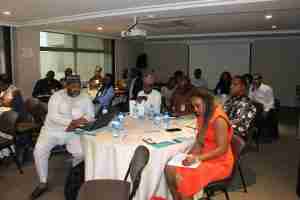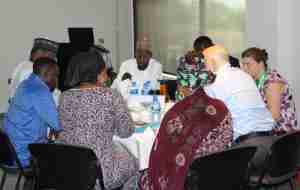 On Thursday 20th February 2020, USAID Nigeria and Partners organized an interactive session on nutrition in Abuja Nigeria as part of the Feed the Future Nigeria Country Plan to increase investments in food security, build greater resilience, and improve household nutrition in the country. The event was a high-profile event that brought together a host of relevant and key stakeholders in the nutrition “space” in Nigeria.
On Thursday 20th February 2020, USAID Nigeria and Partners organized an interactive session on nutrition in Abuja Nigeria as part of the Feed the Future Nigeria Country Plan to increase investments in food security, build greater resilience, and improve household nutrition in the country. The event was a high-profile event that brought together a host of relevant and key stakeholders in the nutrition “space” in Nigeria.
Dr. Charles Iyangbe, Senior Agricultural Economist USAID Nigeria gave the opening remark. In his remarks, he warmly welcomed the participants of the high-profile event including the representatives of government, civil society, private sectors and partners in development. He noted that Nigeria is the most appropriate country for addressing the challenges of malnutrition. At this time, Nigeria faces an epidemic of child malnutrition that some think it seems hard to control. He said “we are meeting at a critical moment for global nutrition and Nigeria specifically”. He further stressed the strong commitment of USAID-Nigeria in tackling the menace of malnutrition in Nigeria. The event aimed at getting partners extensive inputs to USAID/Nigeria Multi-sectoral nutrition strategy, share experiences/key findings on food system and nutrition in Nigeria, private sector engagements in food system and nutrition programming (critical to J2SR), foster partners’ interaction, integration and collaboration/synergy across sector and also agree on key next steps.
 It is attention-grabbing to state that the audience delightedly received interesting presentations from the Nigeria Agricultural Policy Project (NAPP) team on drivers of child nutrition, food systems, and nutrition-sensitive dynamics. Following the presentations by the NAPP Team, the stakeholders were divided into four groups (food systems, health, humanitarian assistance, and education) based on their core expertise with the aim of having an extensive brainstorming session by linking the group thematic area to the proposed USAID Nigeria Nutrition Strategy.
It is attention-grabbing to state that the audience delightedly received interesting presentations from the Nigeria Agricultural Policy Project (NAPP) team on drivers of child nutrition, food systems, and nutrition-sensitive dynamics. Following the presentations by the NAPP Team, the stakeholders were divided into four groups (food systems, health, humanitarian assistance, and education) based on their core expertise with the aim of having an extensive brainstorming session by linking the group thematic area to the proposed USAID Nigeria Nutrition Strategy.
The basic outputs of the session from the groups were highlighted. For the food systems, the key lessons learned and recommendations to the nutrition strategy were the inclusion of private sector in program design (food fortification; policy; enabling environment); scrutinizing the ineffectiveness of value chain approach vs. food systems approach, incomplete/inconsistent nutrition messages from various interventions/programs; gap in nutrition knowledge (intra-household/cultural beliefs/myths) among others.
For the health thematic area, sustainability of intervention is weak and needs systematic, burden of malnutrition is concentrated in the northeast of Nigeria compare to other part of the country, integration approach for service delivery is the best, promotion of nutrition education and Infant and Young Child Feeding (IYCF) across gender line, and identification in change agents for nutrition promotion were recommended.

Lessons discussed to be considered for education in the nutrition strategy were, need for focus on transitional spaces and “graduation” of individuals and communities, measurement of the capacity and resiliency (or lack thereof) of social safety nets is essential in protracted crises, and creative rethinking of livelihoods opportunities is necessary in humanitarian spaces.
To wrap up the event, the audience was thrilled with various Organizations such as FHI360, IITA, FMARD, and CRS giving testimonies on the different projects they are working on and how it has helped improved Private Sector Engagement (Sustainable Financing Initiative). They all acknowledged the event was an eye-opener and a learning session.

